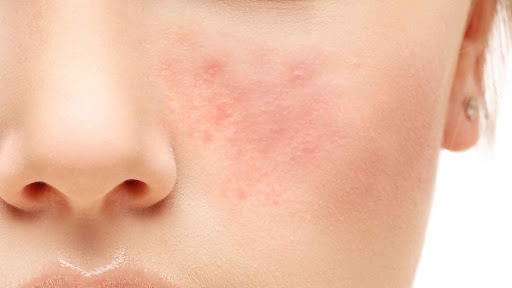Rosacea is a chronic skin condition that manifests through a reddish inflammation of the face. It may also increase the visibility of blood vessels and produce pimples full of pus. The symptoms can last for weeks or months and might disappear only to return after several months. Rosacea can affect anyone with light skin, though studies have found it is most prevalent among middle-aged women.
Symptoms
The most conspicuous symptoms are redness of the skin on the central part of the face. The blood vessels on the cheeks and nose often swell and become pronounced. Some patients also develop bumps that look like acne and contain pus. The inflammation may cause the skin to feel feverish and soft. Many patients also experience dry, swollen eyes with inflamed or swollen eyelids.

In some cases, eye problems may precede skin inflammation. Sometimes people who have rosacea may develop swellings in the nose and cheeks due to the inflammation of the sebaceous glands. This symptom is more common in men than in women.
Causes
The exact cause of rosacea is currently unknown, but it is not an infection. Skin specialists suspect that it is caused by both genetic and environmental factors. Environmental triggers include spicy foods, red wines, and alcoholic beverages. It can also be induced by taking hot drinks frequently as well as extreme weather, such as high temperatures and strong winds. Other causes include overexertion during exercise and medications that affect blood vessels, such as blood pressure treatments. Cosmetics may also trigger the condition for some people.
Risk factors
While anyone with light skin can develop rosacea, the most vulnerable people include light-skinned women, persons who have sunburns, smokers, and individuals with a family history of skin inflammation.
Diagnosis
Since there is no test to confirm rosacea, skin specialists look at the symptoms and condition of the skin to determine if a patient has the disease. They may also conduct tests to exclude skin diseases such as lupus and psoriasis. Some dermatologists may send patients with eye problems to specialists for further evaluation.
Treatment
Unfortunately, rosacea has no cure – though there are remedies that reduce its severity and moderate the symptoms. Typically, dermatologists prescribe treatment to manage the type of inflammation that has developed on a particular patient. Sometimes, they may try different drug combinations until they find a remedy that works.
Most dermatologists use gels or creams such as oxymetazoline to manage the inflammation. The condition can improve within a day of applying them though it needs a regular application to sustain improvements. Another rosacea treatment involves the use of remedies such as metronidazole and azelaic acid to manage pimples and mild symptoms. These often take several days before patients can experience improvements, but the healing lasts longer.
Dermatologists often recommend the acne drug isotretinoin to clear the lesions associated with the condition. Doctors may also prescribe antibiotics such as amoxicillin to treat infections that may result from the inflammation. Some patients undergo light-based therapies to reduce the redness, though they need to undergo repeat treatments to sustain the improvements.
Management
Since rosacea is an inflammatory condition, patients can help to manage it by avoiding the triggers. Studies have found that exposure to sunlight was a precipitating factor in a majority of rosacea sufferers. Therefore, some common sense preventive measures include applying a broad-spectrum sunscreen with an SPF of 30 and above to protect the skin from UVA and UVB rays. Patients should apply the sunscreen before using other cosmetics and avoid makeup and skincare products that trigger inflammation.
Furthermore, vulnerable individuals should use skin protection, such as wearing hats or covering up with an umbrella against the midday sun. Patients should also wear a scarf and protective gear during harsh weather. Finally, vulnerable individuals should avoid hot drinks if possible.
Wrapping up
Rosacea is an inflammation that affects light-skinned people, though it is not caused by an infection. It is a manageable condition if patients seek treatment from skincare specialists and adhere to the therapy program. Patients can reduce the risk of triggering the illness by using sunscreen and other protections when they are outdoors.

